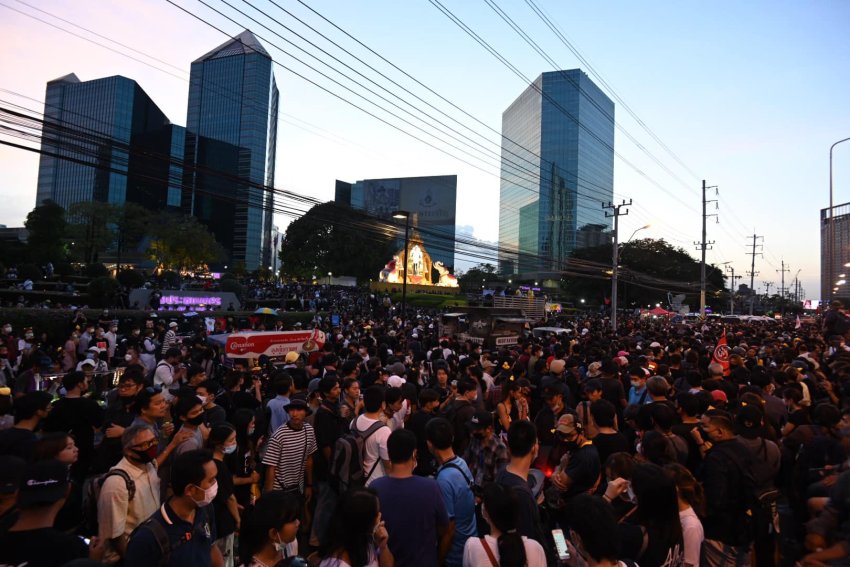
Early in November, during a meet and greet session with fervent royalists, King Maha Vajiralongkorn made these unexpected comments in English to foreign journalists: “We love them all the same,” he said, referring to the youth-led protesters who have been massing in the streets for most of this year, demanding an end to the privileges the monarchy continues to enjoy, the resignation of the current military-installed government and for a more democratic constitution. “Thailand is a land of compromise.”
These comments have now become the butt of jokes and taunts in the democracy movement, because the Thai government has been escalating its attacks on democracy activists over the past weeks and the movement is showing no sign of being cowed by the repression.
So far, 23 democracy activists have been charged under the kingdom's notorious lèse majesté law, section 112 of the Criminal Code, which says: "Whoever defames, insults or threatens the King, the Queen, the Heir-apparent or the Regent, shall be punished with imprisonment of three to fifteen years."
Sentences for multiple convictions under this law lead to cumulative jail terms and one individual has been sentenced to 60 years under this law.
The law had not been invoked since 2018, after international concerns mounted following its use against dissidents in the wake of the 2014 military coup.
Among those now facing charges are popular activists Parit “Penguin” Chiwarak, Panupong “Mike” Jadnok, Panusaya “Rung” Sithijirawattanakul, Jatupat “Pai” Boonpattararaksa, Patsaravalee “Mind” Tanakitvibulpon, Somyot Prueksakasemsuk and human rights lawyer Anon Numpa.
Several activists have been summoned on multiple counts. Penguin is facing five counts, Rung faces three, while Anon, Mind and Chanin Wongri face two counts each, according to a report by Khaosod.
“Using Article 112 makes freedom of expression non-existent,” said Pai. “There is no justice.”
“We will not be bound by the dictatorship and we do not accept section 112 as a law," added Mike, in a defiant mood as he and others turned up for police interrogation over the charges.
There has also been a rise in the number of people charged under the public assembly laws and section 116 of the “Severe State of Emergency” decree declared by Prime Minister (and former general) Prayut Chan-O-Cha on October 13.
According to Thai Lawyers for Human Rights, the number of people charged under public assembly laws has tripled since then, and 175 people have been charged under the emergency decree. The number of activists detained for more than two weeks without convictions has also risen.
Far from being intimidated, the democracy movement has focused its sights on the huge wealth accumulated by the king at the direct expense of the public.
A huge demonstration took place outside the Siam Commercial Bank (SCB) on November 25, after police prevented protesters from approaching the Crown Property Bureau (CPB) with a barricade of shipping containers and razor wire. The CPB is supposed to manage “crown property” (as distinct from the king’s private property) but the Prayut regime has been transferring more and more of its assets directly to the king, who is already the richest monarch in the world.
According Andrew MacGregor Marshall, a former Reuters deputy bureau chief and author of A Kingdom In Crisis, who Thai police accused of committing lèse majesté, the most common figure for the Thai king's wealth is US$30 billion, but this is an underestimate.
The king is one of ten billionaires in Thailand with a combined wealth of US$85.7 billion as at June, according to the Credit Suisse Global Wealth Report. Thailand holds the 19th spot in the 20 countries with the most billionaires. Yet, many Thais live in poverty and Thailand is one of the most unequal countries in the world and the most unequal in Southeast Asia.
A video by the Free Youth movement on the eve of the SCB protest declared: “Under this state, having the king above the constitution not only disgraces the people but also buttresses inequality.
“Under this state, the people are ruled by capitalists, military and feudalists who wretchedly write the law. And under this state, the ruling class oppress the people who are the true founders and heirs of this country.
"Although the old is dying, the new cannot be born. This is a crisis of hegemony. To tackle it, the blind ruling class must surrender to enlightened people, who wish to break the chains and make another world possible.
“This fight is powerfully by the people, not just Free Youth. With three demands — the revision of the constitution, the reform of the monarchy, and the resignation of the dictatorial cronies — the people will liberate themselves. This is not a frivolous fad, this is a fearless fight to light up the future in our generation.”